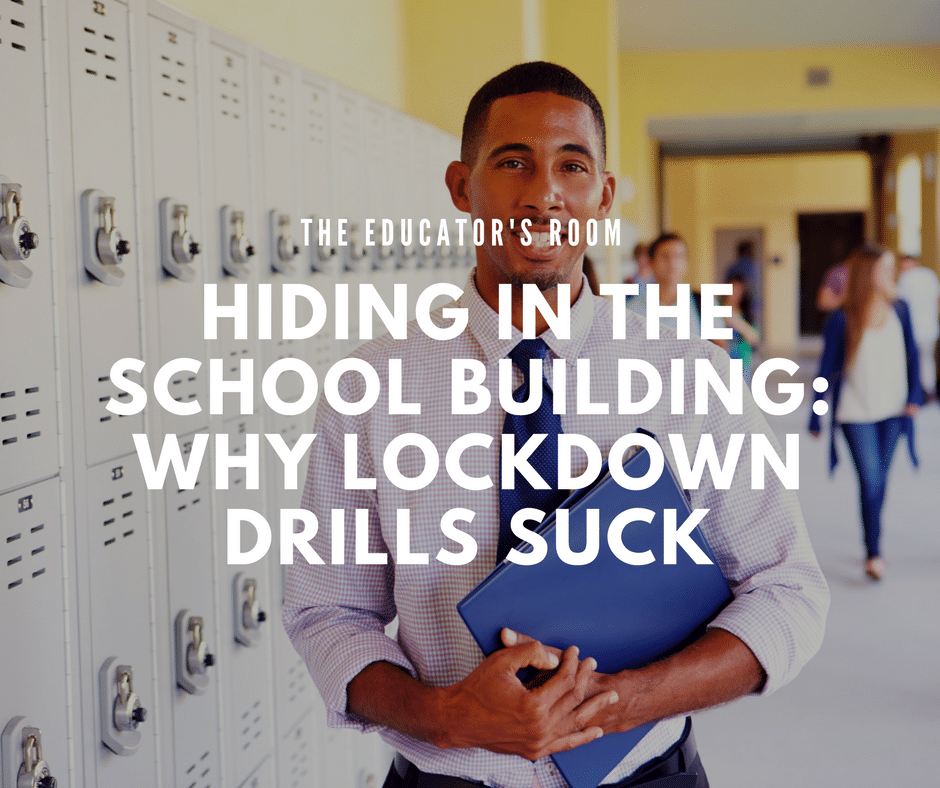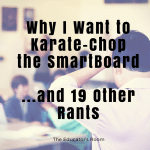We had our first lockdown drill today. For anyone unfamiliar with these drills, it’s practice for not if, but when we have an armed intruder in our school. It involves hiding all students away from any windows or doors and locking them in a secure place. If I am being completely honest, these drills make me tense. There’s a lot of pressure to keep all students silent and to act as quickly as possible. Whenever I pause to think about why we do these drills, I shudder. I always struggle with what to say to my middle school students during these drills and I thank my lucky stars I am not teaching Kindergarten. I can’t even imagine what that’s like.
I am lucky enough to work with small groups of students, so we get to know each other really well. Some of my students I have known for three years so they can read me pretty well. They often ask me questions they probably wouldn’t ask other staff members. So as I was shuffling my three students into the pitch black storage closet this morning, one of my girls, who I will call “Jocelyn,” tapped her Fitbit that was on her wrist and the screen lit up. I had to say to her, “You can’t check your Fitbit while we are in here. You can’t-do anything that will draw attention to this room.” To which she responded in all innocence, “Why?”
I paused for a minute, realizing that no one has probably ever explained to her why we hide in closets and are completely silent. What’s the best way to tell a 7th grader that her innocent fascination with her toy could get her killed? I mean, these drills are literally training her to avoid being shot down by a crazed gunman. How do I gently tell her that? I responded, “Because if there is someone in the school with a weapon wanting to harm people, we would not want to be found. The light from your Fitbit could give us away.” I was relieved that it was dark in the storage room so I couldn’t see the look on her face. We continued to wait in the silent darkness for a few more minutes. I hate these minutes. My mind can’t help but wander to “what if” questions like, what if this isn’t really a drill and there is an active shooter in the building? What if he came to this closet door and shot it open? What would we do? Thank God the drill is only a total of six minutes. Once it was over we opened the closet door and tried to return to our normal routine.
“Why would someone want to shoot at kids in a school?” I heard Jocelyn ask as soon as we were seated at our table. I inwardly groaned. I never know how to answer these questions. I know I could have said that we weren’t going to talk about the lockdown drill anymore, but I could see the worry in her eyes and she had begun to chew on her hair, which is a habit I know she has when she is feeling anxious.
I tried to stay as factual as I could, and I responded, “I think a lot of it has to do with mental health. Historically, people who carry out mass shootings have mental issues that they haven’t taken care of or received help with.” I crossed my fingers and hoped she would accept that answer. I didn’t even want to get into the proliferation of guns or our militarized society or this generation’s obsession with becoming famous.
“Why haven’t they gotten help?!?!?” She almost looked frantic, like the idea that people may not have accessible healthcare had never occurred to her before, and I sure as heck didn’t want to be the one to break it to her.
Good God, why is she asking me all of these difficult questions?
I replied with, “There are many different reasons people might not get help for mental disorders. Sometimes they are hard to see, you know? Like I can tell if someone has a hurt knee or sprained ankle but it’s not as easy to tell if someone is suffering from something in their mind. Or maybe sometimes people think they don’t need help, or they can’t afford help…” I trailed off and started handing out the white boards I use for math instruction, hoping once again that she would be satisfied with that answer.
She got quiet for a moment, thinking about what I told her.
[bctt tweet=”“It just sucks. I don’t like being in dark places, and I definitely don’t like being quiet.” ” username=””]
“I agree,” I said hoping this would end the conversation.
“And people with mental problems shouldn’t have guns.”
It is now the end of the school day and I can not get this interaction out of my head.
My student is right. It does suck that we have to do lockdown drills. It sucks because they make students and teachers anxious. It sucks because lockdown drills make teachers have to answer difficult questions about issues 7th graders shouldn’t be worried about. Lockdown drills make you realize there is a serious need for more accessible mental health care in this country, and this need is far from being met – which sucks. They make you realize that guns are too readily available, and people with mental health problems shouldn’t have access to guns, but they do, and that sucks. Instead of addressing these real problems, we are taking away 6 minutes of instruction for the 50 million public school students in America, twice a year. Do you know how many minutes that is total? Six hundred million minutes. That is what really sucks.






